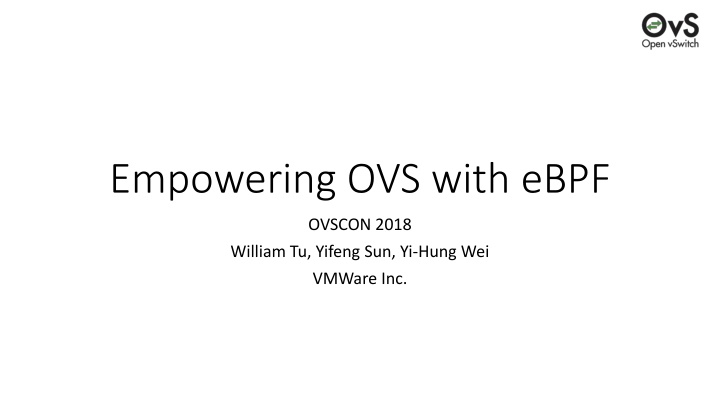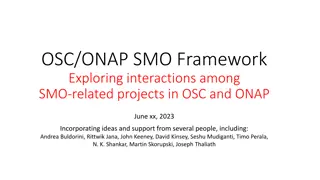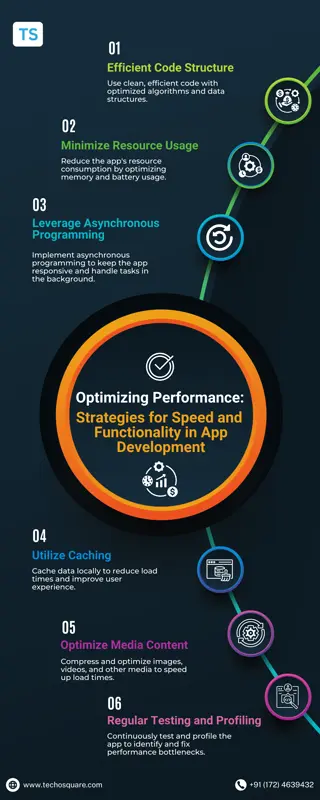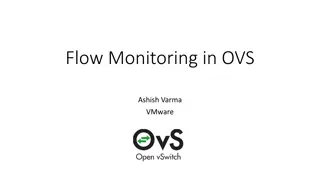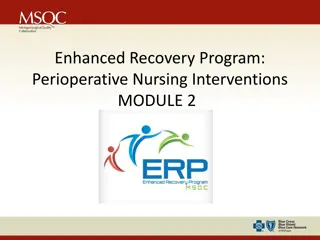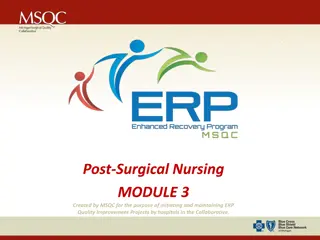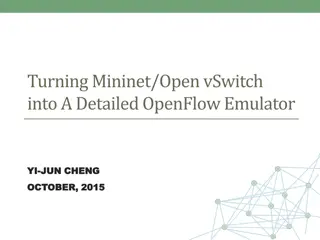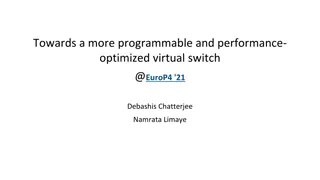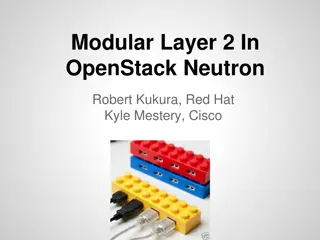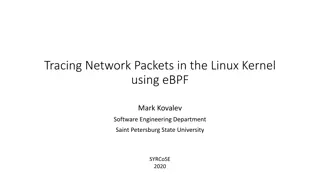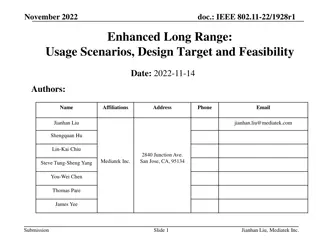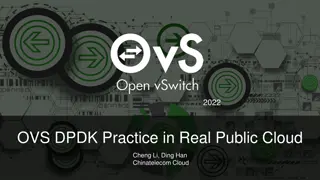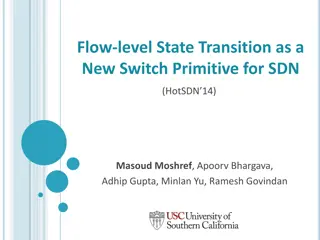Leveraging eBPF for Enhanced Open vSwitch Functionality
Explore how eBPF technology empowers Open vSwitch (OVS) to implement datapath functionalities, reduce kernel version dependencies, and facilitate experimentation. Discover the benefits of eBPF, supported features, and project updates within OVS, enhancing flow processing efficiency and supporting a wide range of actions for improved network performance.
Download Presentation

Please find below an Image/Link to download the presentation.
The content on the website is provided AS IS for your information and personal use only. It may not be sold, licensed, or shared on other websites without obtaining consent from the author.If you encounter any issues during the download, it is possible that the publisher has removed the file from their server.
You are allowed to download the files provided on this website for personal or commercial use, subject to the condition that they are used lawfully. All files are the property of their respective owners.
The content on the website is provided AS IS for your information and personal use only. It may not be sold, licensed, or shared on other websites without obtaining consent from the author.
E N D
Presentation Transcript
Empowering OVS with eBPF OVSCON 2018 William Tu, Yifeng Sun, Yi-Hung Wei VMWare Inc.
Agenda Introduction Project Updates Megaflow support Tunnel support Experience Sharing on eBPF development Conclusion and Future works
OVS-eBPF Project Motivation Goal: Implement datapath functionalities in eBPF Reduce dependencies on different kernel versions More opportunities for experiments Maintenance cost when adding a new datapath feature: Time to upstream and time to backport to kernel datapath Maintain ABI compatibility between different kernel version Backport efforts on various kernels, ex: RHEL, grsecurity patch Bugs in compat code are easy to introduce and often non-obvious to fix 3
What is eBPF (extended Berkeley Packet Filter)? A way to write a restrictedC program and runs in Linux kernel A virtual machine that runs eBPF bytecode in Linux kernel Safety guaranteed by BPF verifier Maps Efficient key/value store resides in kernel space Can be shared between eBPF program and user space applications Ex: Implement flow table Helper Functions A core kernel defined set of functions for eBPF program to retrieve/push data from/to the kernel Ex: BPF_FUNC_map_lookup_elem(), BPF_FUNC_skb_get_tunnel_key() 4
OVS eBPF Project Updates This is a continued work based on Offloading OVS Flow Processing Using eBPF (OVS CON 2016, William Tu, VMware) Supported Features ICMP, TCP and UDP for both IPv4 and IPv6 Bond Tunnels: VLAN, CVLAN, VXLAN, VXLAN6, GRE, GENEVE, GENEVE6 OVN: Logical Routers and Logical Switches New enhancement Introduce dpif-bpf layer New supported actions Megaflow support Tunnel support Supported Actions output(), userspace(), set_masked(ethernet, ip, tunnel()), push_vlan(), pop_vlan(), recirc(), hash(), truncate()
Flow Lookup with Megaflow Support in eBPF Datapath
Review: Flow Lookup in Kernel Datapath Slow Path Ingress: lookup miss and upcall ovs-vswitchd receives, does flow translation, and programs flow entry into flow table in OVS kernel module OVS kernel DP installs the flow entry OVS kernel DP receives and executes actions on the packet Fast Path Subsequent packets hit the flow cache ovs-vswitchd 2. miss upcall (netlink) 3. flow installation (netlink) Parser Flow Table 1. Ingress 4. actions 7
Flow Lookup in eBPF Datapath: 1) Parsing Parser Generate flow key (struct bpf_flow_key) Packet headers struct ebpf_headers_t L2, L3, L4 fields Metadata struct ebpf_metadata_t Packet metadata Tunnel metadata Common parser code (bpf/parser_common.h) can be attached to both XDP and TC hook point Additional metadata are parsed in TC hook point bpf_skb_get_tunnel_key() bpf_skb_get_tunnel_opt() Flow key is stored in a percpu map percpu_flow_key ovs-vswitchd 2. miss upcall 3. flow installation Parser PARSER_CALL Flow Table PARSER_DATA 4. actions 1. Parsing in Ingress percpu_flow_key BPF map 8
Flow Lookup in eBPF Datapath: 2) Upcall Upcall Packets are forwarded to userspace if it does not match any flows in the flow table Utilize eBPF helper function to send packets to userspace via perf event skb_event_output() OVS userspace handler threads poll the perf event to get flow information and do the flow translation ovs- 2. miss upcall vswitchd perf_event PERF_TYPE_SOFTWARE PERF_COUNT_SW_BPF_ OUTPUT 3. flow installation Flow Table MATCH_ACTION_ CALL Parser UPCALL 1. Parsing in Ingress 4. actions BPF map percpu_flow_key 9
Flow Lookup in eBPF Datapath: 3-1) Flow Installation BPF map Exact Match Cache flow_table (BPF_HASH) flow_table (BPF_HASH) Flow Key src=10.1.1.1, dst=10.2.2.2, tp_src=12345, tp_dst=80 Action output: 2 ovs-vswitchd megaflow src=10.1.1.1/255.255.0.0, dst=10.2.2.2/255.255.0.0, tp_src=12345/0, tp_dst=80/0, actions=output:2 3-1. flow installation Megaflow Cache 2. miss upcall megaflow_mask_table (BPF_ARRAY) Index Flow Mask 0 src=255.255.0.0, dst= 255.255.0.0, tp_src=0, tp_dst=0 Parser Flow Table megaflow_table (BPF_HASH) 1. Parsing in Ingress Masked Flow Key Action 4. actions src=10.1.0.0, dst=10.2.0.0, tp_src=0, tp_dst=0 output: 2 10
Flow Lookup in eBPF Datapath: 3-2) Down Call Down Call Write actions and metadata to bpf map execute_actions downcall_metatdata Send packet to a tap interface It is used as an outport for userspace to send packets back to eBPF datapath Downcall eBPF program is attached to the tap interface Downcall eBPF program execute the actions in the map BPF map execute_actions ovs-vswitchd downcall_metadata 3-2. down call TAP 2. miss upcall downcall Parser Flow Table 1. Parsing in Ingress 4. actions 11
Flow Lookup in eBPF Datapath: 4) Fast Path Action Execution Subsequent Packets Look up EMC cache EMC flow table Loop up megaflow cache Apply megaflow mask to flow key Look up megaflow table Store the actions in execute_actions percpu map Execute the actions in execute_actions percpu map BPF map Exact Match Cache ovs-vswitchd flow_table 3. flow installation 2. miss upcall Megaflow Cache megaflow_mask_table Parser Flow Table megaflow_table 1. Parsing in Ingress execute_actions 4. actions percpu_flow_key 12
A Packet Walk-Through in eBPF- Tunnel - eBPF tunnel receive and send - eBPF flow match & actions
Tunnel Setup VM0 10.1.1.100 VM1 10.1.1.1 tap0 tap1 OVS Bridge br0 (bpf) GRE tunnel gre0 br-underlay 172.13.1.100 Remote: 172.13.1.1 Remote: 172.13.1.100 eth0 eth1 172.13.1.1 Local host Physical Connection
Ingress and Egress VM0 10.1.1.100 VM1 10.1.1.1 tap0 BPF tap1 OVS Bridge br0 (bpf) GRE tunnel gre0 BPF BPF br-underlay 172.13.1.100 Remote: 172.13.1.1 Remote: 172.13.1.100 eth0 egress Ingress BPF eth1 172.13.1.1 Local host Physical Connection
Packet Receive (1) # ping 10.1.1.100 VM0 10.1.1.100 VM1 10.1.1.1 tap0 BPF tap1 GRE encaps icmp packet OVS Bridge br0 (bpf) GRE tunnel gre0 BPF BPF br-underlay 172.13.1.100 Remote: 172.13.1.1 Remote: 172.13.1.100 Linux sends packet through eth1 eth0 BPF eth1 172.13.1.1 Local host
Packet Receive (2) # ping 10.1.1.100 VM0 10.1.1.100 VM1 10.1.1.1 tap0 BPF tap1 GRE encaps icmp packet OVS Bridge br0 (bpf) GRE tunnel gre0 BPF BPF br-underlay 172.13.1.100 Remote: 172.13.1.1 Remote: 172.13.1.100 Linux sends packet through eth1 in_port(eth0),ip(src=172.31.1 eth0 BPF eth1 172.13.1.1 Local host .1,dst=172.31.1.100,proto=G RE),actions=output(br0)
Packet Receive (3) # ping 10.1.1.100 VM0 10.1.1.100 VM1 10.1.1.1 tap0 BPF tap1 Linux decaps and delivers packets to gre0 GRE encaps icmp packet OVS Bridge br0 (bpf) GRE tunnel gre0 BPF BPF br-underlay 172.13.1.100 Remote: 172.13.1.1 Remote: 172.13.1.100 Linux sends packet through eth1 in_port(eth0),ip(src=172.31.1 eth0 BPF eth1 172.13.1.1 Local host .1,dst=172.31.1.100,proto=G RE),actions=output(br0)
Packet Receive (4) # ping 10.1.1.100 VM0 10.1.1.100 VM1 in_port(gre0), tunnel(src=172.31.1.1), icmp(src=10.1.1.1,dst=10.1.1. 100),actions=output(tap0) 10.1.1.1 tap0 BPF tap1 Linux decaps and delivers packets to gre0 GRE encaps icmp packet OVS Bridge br0 (bpf) GRE tunnel gre0 BPF BPF br-underlay 172.13.1.100 Remote: 172.13.1.1 Remote: 172.13.1.100 Linux sends packet through eth in_port(eth0),ip(src=172.31.1 eth0 BPF eth1 172.13.1.1 Local host .1,dst=172.31.1.100,proto=G RE),actions=output(br0)
Packet Receive (5) # ping 10.1.1.100 VM0 10.1.1.100 VM1 in_port(gre0), tunnel(src=172.31.1.1), icmp(src=10.1.1.1,dst=10.1.1. 100),actions=output(tap0) 10.1.1.1 tap0 BPF tap1 Linux decaps and delivers packets to gre0 GRE encaps icmp packet OVS Bridge br0 (bpf) GRE tunnel gre0 BPF BPF br-underlay 172.13.1.100 Remote: 172.13.1.1 Remote: 172.13.1.100 Linux sends packet through eth1 in_port(eth0),ip(src=172.31.1 eth0 BPF eth1 172.13.1.1 Local host .1,dst=172.31.1.100,proto=G RE),actions=output(br0)
Packet Send (1) # Send ICMP reply to 10.1.1.1 VM0 VM1 10.1.1.100 10.1.1.1 tap0 BPF tap1 OVS Bridge br0 (bpf) GRE tunnel gre0 BPF BPF br-underlay 172.13.1.100 Remote: 172.13.1.1 Remote: 172.13.1.100 eth0 BPF eth1 172.13.1.1 Local host
Packet Send (2) # Send ICMP reply to 10.1.1.1 in_port(tap0),icmp(src=10.1.1.1 00,dst=10.1.1.1),actions= set(tunnel(tun_id=0x0,dst=172.3 1.1.1,ttl=64,flags(df|key))),outp ut(gre0) VM0 VM1 10.1.1.100 10.1.1.1 tap0 BPF tap1 OVS Bridge br0 (bpf) GRE tunnel gre0 BPF BPF br-underlay 172.13.1.100 Remote: 172.13.1.1 Remote: 172.13.1.100 eth0 BPF eth1 172.13.1.1 Local host
Packet Send (3) # Send ICMP reply to 10.1.1.1 in_port(tap0),icmp(src=10.1.1.1 00,dst=10.1.1.1),actions= set(tunnel(tun_id=0x0,dst=172.3 1.1.1,ttl=64,flags(df|key))),outp ut(gre0) VM0 VM1 10.1.1.100 10.1.1.1 tap0 BPF tap1 OVS Bridge br0 (bpf) GRE tunnel gre0 BPF BPF br-underlay 172.13.1.100 Remote: 172.13.1.1 Remote: 172.13.1.100 gre0 encaps packet and routes packets to br0 to transfer eth0 BPF eth1 172.13.1.1 Local host
Packet Send (4) # Send ICMP reply to 10.1.1.1 in_port(tap0),icmp(src=10.1.1.1 00,dst=10.1.1.1),actions= set(tunnel(tun_id=0x0,dst=172.3 1.1.1,ttl=64,flags(df|key))),outp ut(gre0) VM0 VM1 10.1.1.100 10.1.1.1 tap0 BPF tap1 OVS Bridge br0 (bpf) GRE tunnel gre0 BPF BPF br-underlay 172.13.1.100 Remote: 172.13.1.1 Remote: 172.13.1.100 in_port(br0),ip(src=172.31.1 .100, dst=172.31.1.1, gre0 encaps packet and routes packets to br0 to transfer eth0 BPF eth1 172.13.1.1 Local host proto=GRE), actions=output(eth0)
Packet Send (5) # Send ICMP reply to 10.1.1.1 in_port(tap0),icmp(src=10.1.1.1 00,dst=10.1.1.1),actions= set(tunnel(tun_id=0x0,dst=172.3 1.1.1,ttl=64,flags(df|key))),outp ut(gre0) VM0 VM1 10.1.1.100 10.1.1.1 tap0 Receive packet, decap it and deliver to VM1 by tap1 BPF tap1 OVS Bridge br0 (bpf) GRE tunnel gre0 BPF BPF br-underlay 172.13.1.100 Remote: 172.13.1.1 Remote: 172.13.1.100 in_port(br0),ip(src=172.31.1 .100, dst=172.31.1.1, gre0 encaps packet and routes packets to br0 to transfer eth0 BPF eth1 172.13.1.1 Local host proto=GRE), actions=output(eth0)
BPF Program Limitation Instruction limitation Each BPF program is restricted to have up to 4096 BPF instructions. Break down large function into tail calls Limit the number of iterations
BPF Program Limitation cont. Stack size limitation BPF stack space is limited to 512 bytes Geneve s option can support up to only 4 bytes in metadata. Verifier limitation Can not verify complex code logics; e.g. too many conditional statements Can not verify variable size array Convert TLV into fixed size array
Conclusion and Future Work Features Connection tracking support Kernel helper support Implement full suite of conntrack support in eBPF Pump packets to userspace Lesson Learned Writing large eBPF code is still hard for experienced C programmers Lack of debugging tools OVS datapath logic is difficult 29
TC Hook Point vs. XDP Hook Point User space XDP: eXpress Data path An eBPF hook point at the network device driver level A point before SKB is generated Faster TC Hook Point An eBPF hook point at the traffic control subsystem More kernel helper are available Slower compared to XDP Network Stacks (netfilter, IP, TCP ) Traffic Control (TC) TC Hook Kernel XDP Hook Driver + XDP Hardware 31
